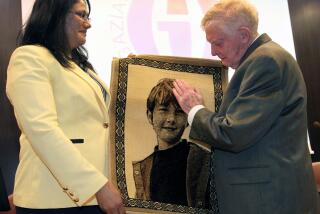Only Days to Live : 16-Month-Old Boy in Urgent Need of Liver
A 16-month-old child is in critical condition at UCLA Medical Center with perhaps only several days to live, unless a new liver is found for him.
The Seattle infant received a liver transplant on May 5, but the organ has stopped functioning because of a blood clot. As a result, his condition is deteriorating rapidly, physicians said Monday.
“We need an organ today or tomorrow--no later than several days,” said Dr. Ronald Busuttil, director of UCLA’s liver transplant program. “He’s gone one week now (on his failing liver), and he’s getting worse.”
Alexander Tufel, who was born with a lethal liver defect that can be cured only with a transplant, is on a respirator in the intensive care unit.
“We are getting very frightened. The waiting is excruciating,” said Alexander’s mother, Dianne Tufel. Alben Tufel, the child’s father, a schoolteacher, is also here.
An “extremely urgent need” call has been sent to major hospitals in California and across the country by the Regional Organ Procurement Agency and United Network Organ Sharing, but no usable liver had been found by Monday, according to Barbara Nuesse, liver donor procurement coordinator at UCLA.
“So far, every time we’ve done a liver transplant, we have been able to find a donor, but organs for children are harder to find than for adults,” Busuttil said. Children who die from accidents, brain tumors or so-called crib death are the chief organ donors for youngsters, he said.
‘Golden Window’
According to the surgeon, a “golden window” of time exists during which a person can survive on a failing liver, but it is hard to predict how long the window is open for any individual.
Unlike patients with kidney failure, who can rely on an artificial kidney to maintain life until a donor organ is found, there is no artificial mechanical means to maintain liver function.
Busuttil said Alexander was doing very well after the transplant until May 10, when an artery that serves the liver became clotted and Alexander’s condition abruptly worsened.
Alexander was born without bile ducts, a condition known as biliary atresia, which in its more serious forms results in cirrhosis of the liver, failure to thrive, bleeding and finally death unless a new organ is obtained.
Busuttil said that about 40% of children who need a liver transplant die before a donor can be found. For those who get a donor organ, a second transplant is required in about 15% of cases, and about 40% of them fail to find another donor. About 140 liver transplants--half of them for patients under 18--have been done at UCLA since the program opened in February, 1984.
Alexander’s mother, an orthopedic technician at a Seattle hospital, said she learned soon after her baby was born that he had a liver problem because he developed jaundice that did not go away. Not long after birth, doctors in Seattle performed surgery to give him new bile ducts, but the operation was not permanently successful, Tufel said.
She took Alexander to UCLA for study last winter, and he was placed on the list for a transplant in January. Seattle has no medical facility that does liver transplants.
“We felt it was too touchy to wait for a donor so far away in Seattle, so Alexander and I moved down here in January,” Tufel said. “Now we’re just waiting.”






